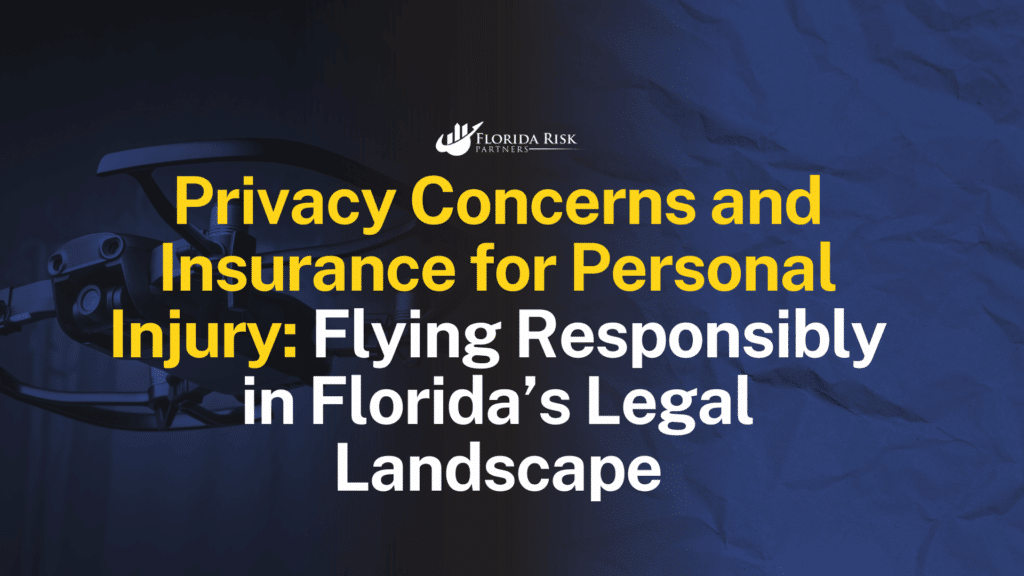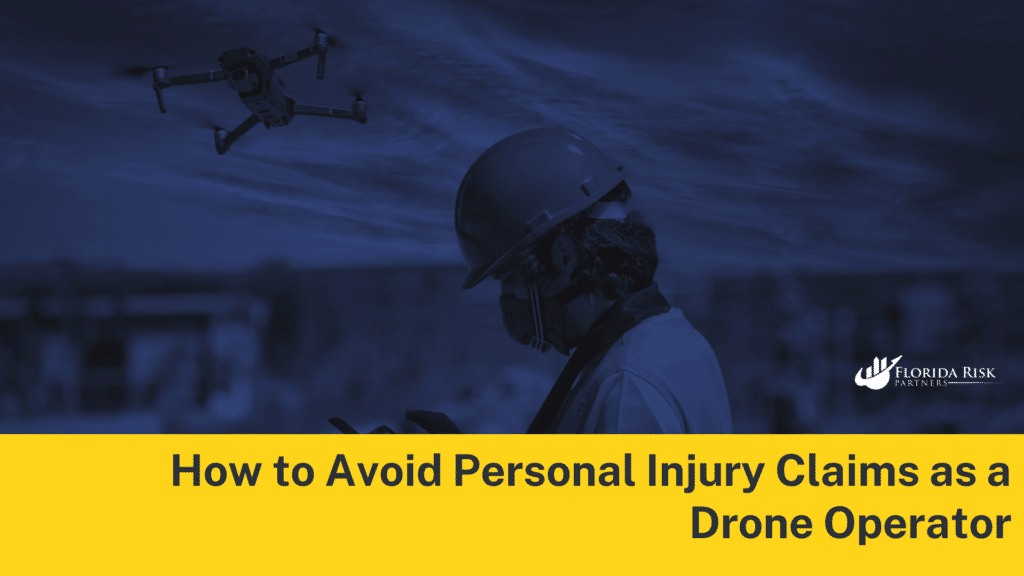-
Main Office: 1434 E. Bloomingdale Ave Valrico, FL 33596-6110
-
Phone: (888) 601-6660
-
Email: info@floridariskpartners.com

Drones now capture weddings, inspect rooftops, survey crops, and record breathtaking aerial footage every single day. Operators must understand privacy laws and personal injury liability as drones become increasingly common in daily activities. Florida enforces strict drone privacy laws, making awareness essential for both hobbyists and commercial drone pilots. Personal injury claims extend beyond physical harm, creating complex legal risks for careless or uninformed drone operators. Drone insurance in Florida helps pilots manage liability, protect themselves, and confidently navigate strict legal and regulatory environments.
This post explores how Florida law actively protects individuals’ privacy from intrusive and unauthorized drone operations. It explains what constitutes a valid personal injury claim when drones invade privacy or cause related harm. These claims significantly impact both commercial drone operators and recreational hobbyists flying casually across Florida’s regulated skies. The right drone insurance coverage protects operators, mitigating liability and addressing uniquely Floridian risks with reliable financial security.
Understanding Personal Injury in the Drone World
When we think of personal injury, the first thing that often comes to mind is bodily harm—cuts, bruises, broken bones. But in the world of drone law and insurance, personal injury has a much broader meaning. It includes:
- Invasion of privacy
- Libel or slander (through recorded content)
- Trespass or wrongful entry
- Appropriation of likeness (unauthorized use of someone’s image or property)
- Public disclosure of private facts
This type of harm isn’t always visible, but it can lead to serious legal consequences. And in Florida, where both privacy laws and litigation are taken very seriously, a drone operator who inadvertently violates someone’s privacy could be facing steep legal bills—even if no physical harm ever occurred.
Let’s say you’re a real estate drone operator in Tampa filming a luxury home for a client. You fly your drone overhead to get a panoramic view of the surrounding neighborhood. Unknowingly, your camera records a neighbor sunbathing in their backyard. You post the video online as part of your property listing—and the neighbor sees it. They didn’t consent to be filmed and feel their privacy has been violated. That neighbor has the right to pursue legal action under Florida’s drone privacy law, even if you had no intention of wrongdoing.
And here’s the kicker: if you don’t have drone insurance that includes personal injury coverage, you’ll be facing the legal consequences and associated costs all by yourself.
Florida Drone Privacy Law: The Freedom from Unwarranted Surveillance Act
Florida has long been at the forefront of drone regulation, particularly when it comes to privacy. The state’s Freedom from Unwarranted Surveillance Act (FUSA)—initially passed in 2013 and later expanded in 2015—is among the strictest drone-related privacy laws in the U.S.
Under this law, it is illegal to use a drone to record images of private individuals or privately owned property without written consent, if the person has a reasonable expectation of privacy. This includes not only photographs but also video and audio recordings. In practice, it means that even if your drone is flying over public airspace, you can be in violation of the law if your equipment records something or someone in a private setting—such as someone in their backyard, on their balcony, or even through an uncovered window.

The law applies equally to commercial and recreational flyers. You don’t have to be a professional operator to be held liable; even a hobbyist with a DJI drone could face a lawsuit if they violate someone’s privacy while flying recreationally.
Violating this law can result in civil penalties, including:
- Compensatory damages for emotional distress or invasion of privacy
- Injunctive relief (a court order preventing future violations)
- Court costs and attorney fees for the plaintiff
That’s a lot to take in for simply flying a drone. But it’s the reality in Florida—and it’s why drone insurance for privacy claims is becoming a critical part of responsible drone ownership.
Why Florida’s Legal Environment Demands Insurance for Personal Injury
Florida is known for more than its beaches and sunshine. It’s also one of the most litigation-prone states in the country. That means if there’s a dispute, there’s a high likelihood it will end up in court. This legal culture makes personal injury liability for drones in Florida a serious risk that drone operators must plan for.
A drone operator in Fort Lauderdale films a beachfront event, professionally capturing sweeping views for promotional purposes. While flying overhead, the drone unintentionally records a celebrity or public figure staying privately nearby. The operator uploads this video on social media, sharing captivating footage that quickly garners attention online. Despite lacking malicious intent, the recorded individual could still file a legitimate privacy violation legal claim. Florida law protects individuals expecting solitude, whether in private backyards, secluded cabanas, or exclusive beachfront properties.
In this case, it wouldn’t matter that the drone operator didn’t intend harm. Florida law doesn’t require intent to file a civil lawsuit for privacy violation. The damage is in the unauthorized capture and dissemination of imagery, which the court may deem unlawful under state law. The resulting legal costs—defense attorneys, settlement negotiations, even public relations help—could cripple a small business or hobbyist financially.
Without drone insurance Florida operators can rely on for personal injury protection, the operator could face those costs out-of-pocket.
What Does Drone Insurance Cover for Personal Injury?
The good news is that many drone liability insurance policies in Florida include a specific clause for personal and advertising injury. This clause typically covers:
- Invasion of privacy claims
- Libel or slander arising from posted drone footage
- Use of someone’s likeness or image without consent
- Trespass-related legal claims, even in ambiguous situations
Coverage often includes both legal defense costs (your attorney’s fees, court costs) and any settlement or damages awarded to the claimant, up to your policy limits.
However, not all drone insurance policies automatically include personal injury coverage—especially lower-tier or recreational plans. If you’re operating in Florida, where privacy lawsuits are not just possible but increasingly common, it’s crucial to review your policy and make sure this coverage is included.
For commercial drone operators, this coverage is typically bundled into more robust commercial drone insurance Florida packages, which can also include general liability, hull coverage, and payload protection. For hobbyists, standalone recreational drone insurance Florida policies may offer personal injury coverage as an add-on or upgrade.
How to Avoid Personal Injury Claims as a Drone Operator
While insurance is essential, prevention is always the best strategy. Understanding and respecting Florida’s privacy laws will not only reduce your risk of liability but also show your clients and community that you operate responsibly.
Here are several best practices to follow when flying drones in Florida:
Always Get Consent
If you’re flying near or over private property—whether for commercial or recreational purposes—seek written permission from the property owner or occupant. Even if you’re in public airspace, if your camera is pointed at private activities, you could be liable for an invasion of privacy claim. A simple waiver or release form can go a long way toward protecting your operation.

Avoid Filming People Without Permission
If your flight path takes you near residential neighborhoods, backyards, or any location where people might expect privacy, avoid filming unless it’s absolutely necessary. Use zoom functions or altitude to avoid capturing identifiable images of individuals.
Don’t Publish Footage Without Review
Before sharing your footage publicly, review your content carefully. Make sure there are no individuals, license plates, or property features that could be construed as invasive or personally identifying. If in doubt, blur out faces or identifying features—or seek legal advice.
Respect No-Fly Zones and Sensitive Locations
Florida has many areas where drone use is restricted or banned, including state parks, wildlife reserves, and certain government buildings. Violating these restrictions can lead to additional legal complications, particularly if you record video of protected locations or individuals.
Keep Up with Regulatory Changes
Drone laws and regulations are evolving fast. What was allowed last year might now be restricted. Stay informed by following FAA updates, state legislation, and local ordinances—especially in counties with high tourism or population density, where privacy is a heightened concern.
Real-World Legal Examples in Florida
Legal cases involving drones and privacy violations are no longer rare. In 2021, a Florida homeowner sued a drone operator after discovering drone footage of their backyard, including their children swimming in the pool, had been published online. The case didn’t involve any physical trespass, but the emotional distress and privacy breach were enough for the judge to let the case proceed.
The drone operator argued that they were flying legally under FAA rules. But the court noted that FAA compliance does not exempt drone users from state civil liability. In other words, just because you’re flying legally in the sky doesn’t mean you’re immune to lawsuits on the ground.
Cases like this underscore how important it is for Florida drone operators to carry insurance that includes protection from personal injury claims, especially when operating in residential, recreational, or tourist-heavy areas.
How to Choose the Right Drone Insurance for Privacy Claims
If you’re in the market for Florida drone insurance, here are a few things to look for when it comes to privacy and personal injury protection:
- Confirm that personal and advertising injury coverage is included in your liability policy. This should cover privacy invasion, wrongful entry, and use of likeness.
- Check policy exclusions. Some policies may exclude coverage if you’re violating state or federal laws, even unintentionally.
- Choose a policy tailored to Florida operators, with coverage for the unique risks the state presents.
- Look for flexible coverage amounts that reflect the scale of your operation. A small hobbyist doesn’t need the same limits as a commercial drone film crew—but everyone should be covered.
- Work with a provider familiar with Florida drone regulations, who can help you build a policy that aligns with your risk profile.
The Bottom Line: Protect Privacy and Protect Yourself
Flying drones in Florida is exciting, profitable, and, thanks to our landscape and weather, visually stunning. But it also comes with legal strings attached—especially when it comes to privacy and personal injury liability. Whether you’re filming homes, capturing beach weddings, surveying farmland, or just flying for fun, you need to understand and respect Florida drone privacy law.
You also need to be prepared in case something goes wrong. One inadvertent shot of a private moment could result in a lawsuit, and even if you win in court, the cost of defending yourself could be thousands of dollars.
That’s why having drone insurance in Florida that includes personal injury coverage is more than a smart precaution—it’s a non-negotiable part of responsible flight.
Next week, we’ll explore how Florida’s unique weather patterns—from pop-up storms to hurricane season—affect drone operations and what role insurance plays in weather-related risks. Until then, fly high, fly smart, and always fly with respect for the people and privacy below.
Call Us Or
Schedule an Appointment
Select an agent below to view our online calendars and select a day and time that works best for you or call us directly at 888-601-6660. When you use our online calendars, you will receive an email with more information.



